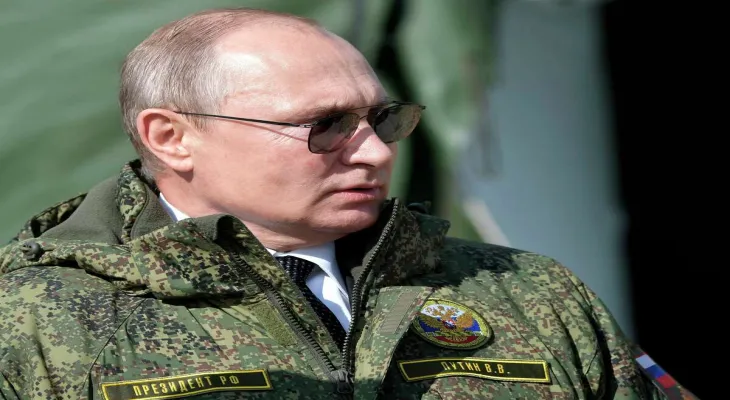Search here
Newspaper
Search here

Arab Canada News
News

Published: October 4, 2022
Russian President Vladimir Putin watches a military maneuver outside Vladivostok on September 6. Putin’s threats to use “all means at our disposal” to defend his country as it wages war in Ukraine have sparked global fears that he may use his nuclear arsenal. (Mikhail Klimentiev / Sputnik / Associated Press)
With Russia losing its territories in eastern and southern Ukraine even as it claims to annex them, Kremlin watchers face a pressing question: Will President Vladimir Putin pull the nuclear trigger?
For now, analysts cautiously point out that the risk of Putin using the world's largest nuclear arsenal remains low. The CIA says it has seen no signs of an imminent Russian nuclear strike.
William Burns, director of the CIA, told CBS News on Monday, “We see no actionable evidence today in the U.S. intelligence community that he is any closer to actual use, and that there is an imminent threat of using tactical nuclear weapons.”
“What we have to do is take it seriously, watch for indicators of actual preparations.” A nuclear strike could turn Putin into a global pariah’s Kremlin watchers shake their heads at Putin’s threats to use “all means at our disposal,” partly because they don’t see how nuclear force could significantly help reverse Russia’s military losses in Ukraine.
Ukrainian forces do not use large concentrations of tanks to reclaim land, and fighting is sometimes in small places like villages. So what could Russian nuclear forces aim to achieve for impact? A violent reaction could also turn Putin into a global pariah.
The Sarmat intercontinental ballistic missile was launched from Plesetsk in northwestern Russia, in this photo released in April.
Putin has warned he will not hesitate to use nuclear weapons to deter Ukraine’s attempt to regain control of its occupied areas Moscow is trying to absorb. (Roscosmos Press Service / Associated Press)
Siddharth Kuchel, a researcher at the Royal United Services Institute in London specializing in defense and security, said, “Breaking nuclear taboos would impose, at minimum, full diplomatic and economic isolation on Russia.”
Long-range nuclear weapons that Russia could use in a direct conflict with the United States are battle-ready. But analysts say its stock of shorter-range warheads — so-called tactical weapons that Putin might be tempted to use in Ukraine — are not.
Pavel Podvig, another senior researcher specializing in nuclear weapons at the United Nations Disarmament Research Centre in Geneva, said, “All of these weapons are in storage.”
He said, “You have to take them out of storage and load them onto trucks” then marry them to missiles or other delivery systems.
There are likely to be other escalations before nuclear weapons. Analysts also expect another escalation first, including heavy Russian strikes in Ukraine using non-nuclear weapons.
Nikolai Sokov, who participated in arms control negotiations while working at the Russian Foreign Ministry and is now with the Vienna Center for Disarmament and Non-Proliferation, said, “I don’t think there will be a lightning bolt from the blue.”
Putin may hope that the threats alone will slow Western arms supplies to Ukraine and buy time to train an additional 300,000 troops he is mobilizing, leading to protests and displacement of men of conscription age.
U.S. President Joe Biden speaks about Russia from the Roosevelt Room at the White House in Washington on Friday. The U.S. would have several options if Russia launched a nuclear strike. (Susan Walsh / Associated Press)
As the dominant global superpower, the U.S. would effectively decide how to respond to any Russian nuclear strike. President Joe Biden’s options would include a nonmilitary response, a nuclear strike in retaliation risking escalation, and a conventional strike that could involve Washington in direct war with Moscow.
U.S. National Security Advisor Jake Sullivan said Washington warned Moscow of “specific catastrophic consequences” if it used nuclear weapons.
Retired general says U.S. would sink Russian fleet Retired general and former CIA director David Petraeus said that if Moscow used nuclear weapons, the U.S. and its NATO allies would destroy Russian forces and equipment in Ukraine — and sink its entire Black Sea fleet.
Although Russia has specialized nuclear forces trained to fight in such a horrific battle, it is unclear how that happens
An army of regular troops, mercenaries, reservists, and local militias would face it.
The Kremlin said Tuesday it does not want to engage in the “nuclear rhetoric” the West is spreading after a media report said Russia is preparing to show its willingness to use nuclear weapons through a test on the Ukrainian border.
Editing: Yousry Bamtarf
Comments